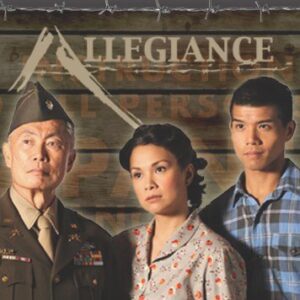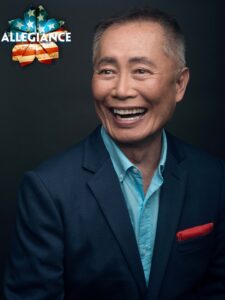Arts & Entertainment
Part Two: Allegiance Opens on Broadway Starring George Takei Who Speaks of One of the Most Shameful Periods in America
Special to HottyToddy.com
The story behind the new musical Allegiance is not only very much close to George Takei’s heart, but was also heavily influenced by his own experiences in the WWII internment camps for Japanese-Americans.
Takei says that immigrant issues are very much relevant in today’s politics. “When Donald Trump says Mexican immigrants are rapists and criminal with such a broad stroke of the brush, he denigrates all Mexicans. After 9/11, we had attacks on Arab-Americans. Then, Japanese-Americans were the enemy. We’ve got to learn from history. Unfortunately, this chapter of American history is little known or has been forgotten.”
Being a youngster, Takei, who was surrounded in the blocks by those his own age, found a childhood. “Dad told us we were going on a long vacation. It was far from a vacation, but there were good memories. We played in a creek, or as the folks down there called it, a crick. We’d take glass jars and capture pollywogs [tadpoles] and watch them sprout legs and turn into frogs.”
Several years later, Takei lashed out at his father over how he allowed the government to put the family in the camps without protest. “ I told him that he led us like sheep to the slaughter. He replied, ‘Maybe you’re right.’ He went into his room and closed the door. I hurt him deeply and, even worse, I never apologized. It has remained one of my biggest regrets. Being in Allegiance and telling this story is one way of saying I’m sorry.”
In spite of the degradation and horrible conditions of the internment, Takei says his father “believed in the fundamental ideals of the United States. And this is a man who lost everything. Yet, he was able to define democracy for us as a people’s democracy, and said it can not only be as great as the people are, but also as fallible as people are; that our democracy is vitally dependent on people who cherish the ideals and actively engage in the process of a democratic government.”
Takei credits his father for shaping the ideals he’s lived by. He’s most memorably known for his role over three years as Hikaru Sulu on Gene Roddenberry’s Star Trek. However, he has a storied career in TV and film since the mid-50s when he did English dubbing for Japanese actors in Godzilla and Rodan monster movies; and has been an outspoken political advocate for gay rights and marriage equality.
His family began to put their lives back together at war’s end. “When the gates of the camp opened,” he remembers, “we were given a one-way ticket to anywhere in the United States and $25. That was it. Everything was taken from us. We were supposed to rebuild our lives with $25. My parents decided to return to Los Angeles. However, the hostility toward Japanese Americans was strong. I learned about prejudice after I came out from the camp.
“Finding housing was next to impossible,” he adds. “Our first home on reentering society was a hotel room on L.A.’s kid row. It was horrible, frightening. There was the stench of urine everywhere. I had been very sheltered. As a child, the scary people leaning against walls were terrorizing. My father’s first job was as a dishwasher in Chinatown.”
His father was a block manager in the camps, so older Japanese came to him for help and assistance in finding places to live and get work. In a great test of resilience, his father opened an employment office in Little Tokyo. The kind of jobs he was able to find paid a pittance – janitors, dishwashers, gardeners.
“The hostility didn’t go away,” Takei states. “In grammar school, my teacher Mrs. Ruggen referred to me as a Jap. It hurt. She never called on me when I raised my hand. She hated me, and I hated her right back. As an adult, thinking back, I thought maybe she had a son or husband in the Pacific theatre and lost them. I couldn’t understand why she treated me as she had. I’d done nothing.”
His father eventually found a dry cleaning shop in Mexican-American-dominated East L.A. One benefit of that was that Takei learned to speak Spanish. “Everyone worked long, hard, killing hours. I’m still astounded how in four years, dad was able to save enough to buy a three-bedroom home in the mid-Wilshire district. That became our new beginning with grammar school and so forth. Just as we were getting back on their feet, he switched to real estate. He was helpful to the community in purchasing homes and businesses. And out of the ruins, he became quite successful.”
It was uncommon for the older Japanese-Americans to discuss the camps. “They felt so wounded and ashamed of that chapter in their lives, they never wanted talk about it. Sadly, there’s very little in the history books.”
It was a long struggle to get an apology and compensation from the United States. In the 70s, a movement began in the Japanese-American communities to get redress. Congress formed a commission. Takei was among those who testified at the hearings. In 1988, President Reagan signed the Civil Liberties Act and formally apologized and pledged $20,000 to each family.
“That, sadly, was a mere token of what we all lost,” says Takei, “but it was a token. I didn’t get my check until George H. W. Bush was president. I donated it to L.A.’s Japanese-American National Museum, which tells our story.”
Ellis Nassour is an Ole Miss alum and noted arts journalist and author who recently donated an ever-growing exhibition of performing arts history to the University of Mississippi. He is the author of the best-selling Patsy Cline biography, Honky Tonk Angel, as well as the hit musical revue, Always, Patsy Cline.
Follow HottyToddy.com on Instagram and Twitter @hottytoddynews. Like its Facebook page: If You Love Oxford and Ole Miss…
































